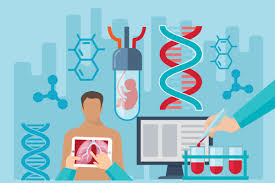Impact of Genetic Engineering on Human Life and Environment

Genetic engineering, a branch of biotechnology, involves the meticulous and direct modification of the DNA (genetic material) of living organisms to alter their characteristics or functions. This technology, when used responsibly, allows scientists to add, remove, or change specific genes within an organism’s genome, always with safety and ethical considerations in mind.
In more detail, Genetic engineering is the deliberate manipulation of an organism’s genetic material using biotechnology. This typically involves isolating a specific gene from one organism and inserting it into the genetic material of another organism, thereby introducing desirable traits or removing unwanted ones.
Examples:
- Inserting a gene for pest resistance into corn plants.
- Modifying bacteria to produce human insulin for diabetes treatment.
- Using CRISPR to correct genetic mutations in human cells.
The Impact of Genetic Engineering on Human Health
Genetic engineering is poised to revolutionize human health, offering new solutions for preventing, diagnosing, and treating diseases. Here’s how:
1. Gene therapy development
In order to treat diseases, gene therapy entails changing or replacing defective genes within an individual’s cells. This innovative method shows promise for ailments for which there was previously no treatment, including:
- Fibrosis in cysts
- Haemophilia
- Dystrophia of the muscles
- Some forms of cancer
2. Vital Medicine Production
Scientists can use genetic engineering to produce microorganisms (such as bacteria or yeast) that make vital medications, such as:
- Genetically engineered insulin for Diabetes
- Growth hormones and vaccinations against COVID-19 and hepatitis B
As a result, these treatments are now more widely accessible and reasonably priced.
3. Customised Healthcare
Genetic engineering allows for treatments tailored to individuals based on their genetic makeup. Doctors can use genetic information to:
- Predict disease risks
- Choose the most effective treatments
- Minimize side effects
Precision medicine is transforming the treatment of rare genetic disorders and diseases like cancer.
4. CRISPR and Genome Editing
The development of CRISPR-Cas9 and similar tools enables precise editing of genes. This technology is being used to:
- Correct genetic mutations
- Develop potential cures for inherited diseases
- Study the function of specific genes in health and disease
5. Improved Diagnostics
Genetic engineering has improved the sensitivity and accuracy of diagnostic tests. For example:nRapid genetic tests to identify infections or inherited disorders and early detection of diseases, enabling timely intervention.
6. Prevention of Genetic Disorders
With advances like preimplantation genetic diagnosis (PGD), it’s possible to screen embryos for genetic diseases before implantation during in vitro fertilization (IVF), reducing the risk of passing on serious inherited conditions.
7. Improved Nutrition
Biofortified Foods: Creation of nutrient-rich crops (e.g., Golden Rice with added Vitamin A) to combat malnutrition in developing countries.
Genetically Modified Organisms (GMOs) and their Environmental Impact
Genetically Modified Organisms (GMOs) are plants, animals, or microorganisms whose genetic material has been altered using genetic engineering techniques. Most commonly, GMOs refer to crops that have been engineered to possess traits like pest resistance, herbicide tolerance, or improved nutritional content.
Positive Environmental Impacts of GMOs
Reduced Pesticide Use:
Some GM crops, such as Bt corn and Bt cotton, are engineered to produce their own pest-resistant proteins, which can significantly reduce the need for chemical pesticides. This can result in less chemical runoff and lower toxicity to non-target organisms.
Higher Crop Yields:
GMOs can be engineered for better resistance to disease, drought, and harsh environmental conditions, leading to higher agricultural productivity on the same amount of land. This can help conserve natural habitats by reducing the need to clear more land for farming.
Conservation of Resources:
Drought-tolerant GM crops and crops that require less fertilizer can help conserve water and reduce the environmental impact associated with fertilizer use.
Negative Environmental Impacts of GMOs
Risk to Biodiversity:
The widespread planting of a few GM crops can lead to a reduction in plant diversity. There is also concern about genetically engineered genes transferring to wild relatives (gene flow), potentially creating “superweeds” or affecting ecosystem balance.
Development of Resistant Pests and Weeds:
Overreliance on GMOs with built-in pest or herbicide resistance can lead to the evolution of resistant insects (“superbugs”) and weeds, which may require even more chemical treatments over time.
Regulation and Monitoring
To address these concerns, governments and international organizations have established regulations to assess the safety and environmental impact of GMOs before they are approved for commercial use. Ongoing monitoring aims to identify and manage potential risks.
Applications of Genetic Engineering
Medicine: Creating genetically modified bacteria to produce insulin or other drugs, and developing gene therapies for genetic disorders.
Agriculture: Producing genetically modified crops that are resistant to pests, diseases, or environmental conditions.
Research: Studying genes and their functions to understand diseases and biology better.
Conclusion:
Genetic engineering is a powerful tool that has revolutionized fields like medicine, agriculture, and research. By precisely altering the genetic code, scientists can solve complex problems, improve human health, increase food production, and advance our understanding of life itself. Genetic engineering is creating new opportunities to improve human health, fight diseases, and increase food security, while also offering innovative ways to protect the environment and conserve natural resources. When used responsibly, these technologies can play a crucial role in addressing global challenges.




